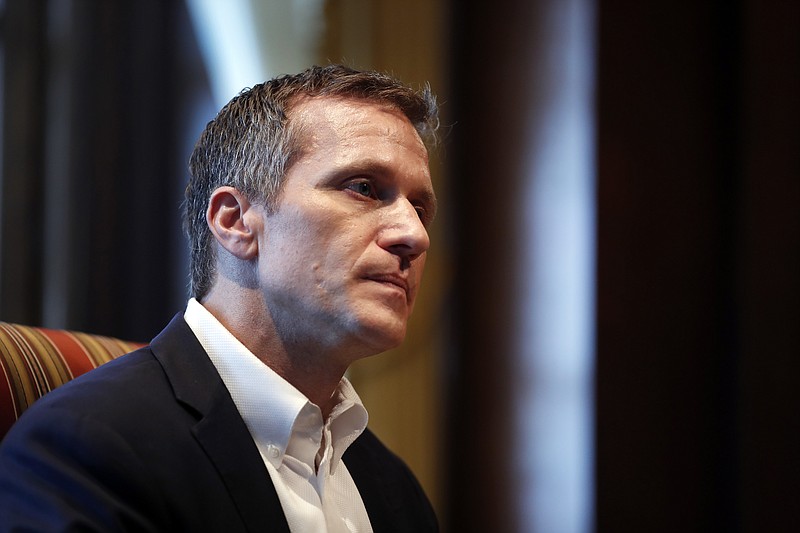Gov. Eric Greitens' K-12 public education budget priorities for the 2019 fiscal year are based on a philosophy that teachers in Missouri are underpaid and administrative costs are rising too high.
"Teachers in Missouri are not getting the pay they deserve, yet costs of administrative overhead continue to rise," Greitens stated in his budget priorities.
Some of the questions that arise from those assumptions are examined below.
Are Missouri teachers underpaid compared to their counterparts in other states?
Greitens cited in a November statement that "Missouri is ranked fortieth in the country in teacher pay." That's also what the National Education Association reported in May 2017 in its latest "Rankings of the States 2016 and Estimates of School Statistics 2017."
The average salary of Missouri teachers in 2016 was $47,957, according to the report - a 1.1 percent increase over 2015, when the state was ranked 43rd in the United States by average teacher salary.
New York had the highest average teacher salary in 2016 at $79,152. The rest of the top 10 areas were California, Massachusetts, the District of Columbia, Connecticut, New Jersey, Alaska, Maryland, Rhode Island and Pennsylvania.
Still, Otto Fajen, legislative director of the Missouri National Education Association, doesn't believe average salary differences alone necessarily put Missouri teachers at a disadvantage.
"As long as Missouri has some reasonable balance between teacher pay and cost of living," he said, candidates interested in the state will come.
"That's going to be their calculus," he said of balancing a prospective salary with living expenses. While a career in a place like California pays a lot more, he added, "I have to make this much more in Los Angeles."
"We need quality and appropriately compensated people at every level," he added, but "those are fundamentally local decisions to find the right mix and balance."
Has pay for administrators outpaced teacher pay in Missouri?
Average superintendent salaries increased by 31 percent, and average administrator salaries - including superintendents - increased by 27 percent, compared to a 22 percent increase for teacher salaries. That's according to an audit released in December by the office of Missouri State Auditor Nicole Galloway.
The average superintendent salary in the 2015-16 school year was $109,000, the report noted. For administrators, including superintendents, it was $78,000. The average teacher salary in the state was $41,000.
The state auditor's office also found issues of transparency and accountability with how superintendent and executive director salaries are reported to the Department of Elementary and Secondary Education.
"For the 2015-16 school year, we identified 128 (26 percent) of the 492 schools that reported salaries to DESE had a difference of more than $1,000 between the salaries reported to DESE and amounts reported in our survey."
There are 516 school districts in the state, according to the auditor's report.
"DESE does not have procedures in place to identify and follow up with schools that submit inaccurate salary information," the report noted.
The report also noted superintendents and executive directors can receive compensation beyond their salaries that might not be reported to DESE - perks such as "vehicle and moving allowances, contributions to retirement account and annuity plans, additional life insurance plan payments, fitness center family memberships, internet/cable service allowances, cellular phone allowances, bonuses, payments for extra duties and non-renewal payments."
The state auditor's office recommended DESE implement procedures to collect accurate and complete information for administrators from all districts, including "compensation not received by other school employees."
DESE responded it would change its data collection system to include all compensation, but added, "The department lacks the statutory authority to require (schools) to report this information," and furthermore lacks the legal authority to require charter schools provide "written agreements or other formal policies on administrator rights, responsibilities and compensation."
How do local districts compare to other parts of the state in administrator and teacher pay?
The Blair Oaks R-2 and Jefferson City Public Schools districts pay teachers a higher minimum salary for holding a bachelor's degree than the overall state average of $32,004, according to the latest report from the Missouri State Teachers' Association.
Blair Oaks' minimum salary is approximately $1,200 higher than the average for other districts its size - based on enrollment - while JCPS is about $1,400 below the average for districts its size, according to the report.
The central region of the state - which by the report's classification includes Cole, Callaway, Osage, Moniteau and Boone counties, among others - has an average minimum salary of $31,191 for teachers with a bachelor's degree that's the third lowest of the seven regions of the state.
The average teacher salaries at Blair Oaks and JCPS in the December state auditor's report were higher than the statewide average of $41,000 - JCPS paid more than $48,000, and Blair Oaks more than $43,000. That would make JCPS' average salary higher than the state average cited in the NEA report.
Blair Oaks, JCPS and nearby Columbia had administrative expenditures cost 10 percent of their respective budgets. Joplin Schools' - a district of close size to JCPS - administrative expenditures also cost 10 percent of its budget.
The top administrative salary the state auditor's office noted for JCPS was $180,000, compared to $177,775 for Joplin - both lower base salaries than some other districts their size such as Raytown, Ferguson-Florissant or Mehlville, which also had administrative pay cost higher percentages of their budgets.
JCPS' top administrative position in 2015-16 paid more than Columbia Public Schools' $167,706. With extra compensations like the types noted in the state auditor's report, the top-paid administrator position at JCPS actually received $226,775 in 2015-16, and Blair Oaks' top-paid administrator received $113,392, with a base salary of $108,000. With extra compensation, Columbia's top-paid administrator received $209,625 in 2015-16.

